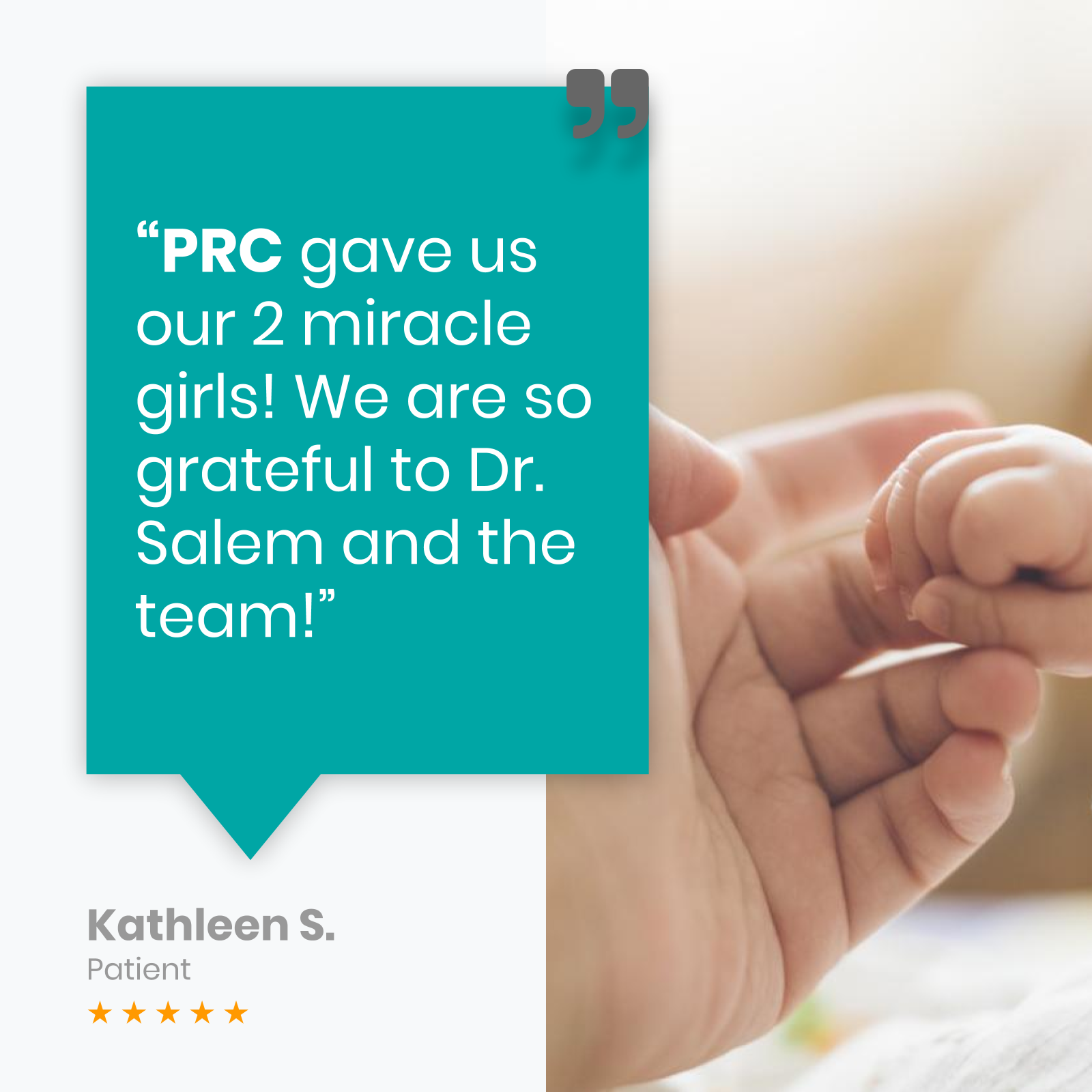At Pacific Reproductive Center, we understand ovulation’s critical role in achieving pregnancy.
Ovulation, the release of mature eggs from the ovaries into the fallopian tube, is essential for successful conception. When an egg is fertilized by sperm during ovulation, it journeys down the fallopian tube and implants in the uterus, leading to pregnancy.
For many women struggling with infertility, irregularities in ovulation are a common underlying issue. To learn more about ovulation induction to help with infertility, contact us today or continue reading below.
Why Don’t I Ovulate Regularly?
Around 25% of infertile women have ovulation difficulties. These problems include producing a fully mature egg or failure to release the egg (ovulate). Fertility drugs can be used to temporarily correct these problems and increase the chance of getting pregnant.
The events that lead to pregnancy and birth are complex. Numerous factors can inhibit successful outcomes, resulting in fertility challenges that might or might not be correctable.
Ovulation irregularities are among the most common reasons for female infertility.
There can be multiple medical reasons why ovulation problems occur, including (but not limited to):
- thyroid problems
- infections
- fibroid tumors
- certain autoimmune disorders
If it is determined that your failure to ovulate is due to a treatable medical issue, it is advised that you seek the appropriate fertility treatments to manage the problem before undergoing any fertility procedures.
The good news is that help is available, including ovulation induction.
What is Ovulation Induction?
Ovulation induction is a specialized fertility treatment that stimulates ovulation in women who experience irregular or absent ovulation, a condition known as anovulation.
This process involves using medications to encourage the release of mature eggs from the ovaries. By promoting ovulation, ovulation induction increases the chances of conception through either natural intercourse or assisted reproductive techniques such as intrauterine insemination (IUI).
Ovulation induction can be used for women with:
- Polycystic ovary syndrome (PCOS)
- Inadequate production of luteinizing hormone and follicle-stimulating hormone.
- Obesity
- Thyroid disorders
- Eating disorders
The Benefits of Ovulation Induction
Ovulation induction can offer several benefits to individuals or couples trying to conceive.
Here are some key advantages:
- Stimulates ovulation: Ovulation induction helps stimulate the development and release of eggs from the ovaries, which is essential for conception. This can be especially helpful for women who have irregular menstrual cycles or do not ovulate regularly on their own.
- Increases chances of conception: By ensuring the release of mature eggs, this procedure increases the likelihood of successful fertilization when timed with intercourse or assisted reproductive technologies such as intrauterine insemination (IUI) or in vitro fertilization (IVF).
- Monitors reproductive health: During ovulation induction, healthcare providers closely monitor the growth of ovarian follicles and hormone levels through ultrasounds and blood tests. This monitoring helps optimize the timing for intercourse or other fertility procedures.
- Addresses hormonal imbalances: Ovulation induction is often used to treat hormonal imbalances, which can interfere with regular ovulation. By correcting these imbalances, ovulation induction improves fertility outcomes.
- Customized treatment: Treatment protocols can be tailored to each individual’s specific needs and medication response. This personalized approach maximizes the chances of successful ovulation and conception while minimizing risks and side effects.
- Complements assisted reproductive techniques: For couples undergoing procedures like IUI or IVF, ovulation induction can enhance the number and quality of eggs available for fertilization, improving the overall success rates of these treatments.
- Low cost compared to advanced treatments: Ovulation induction is generally less expensive than more complex fertility treatments such as IVF, making it a more accessible option for many couples seeking help with conception.
- May reduce emotional stress: For individuals or couples experiencing infertility, successfully inducing ovulation and achieving conception can bring a sense of hope and progress on their fertility journey, potentially reducing emotional stress and anxiety associated with infertility.
It’s important to note that while ovulation induction can be highly effective for many individuals, it may not be suitable or effective for everyone. Consulting with our fertility specialists is crucial to determine the most appropriate treatment approach based on individual circumstances and fertility factors.
Ovulation Induction in PCOS
Ovulation induction plays a vital role in managing polycystic ovary syndrome (PCOS), a common condition characterized by hormonal imbalances and irregular ovulation.
For women with PCOS, ovulation induction medications are often used to stimulate follicle development and promote ovulation. This helps regulate menstrual cycles, improve fertility, and increase the chances of successful conception for women with PCOS who are trying to get pregnant. Close monitoring by healthcare providers ensures safe and effective use of these medications tailored to each individual’s response and needs.
The Ovulation Induction Procedure: Step by Step
The ovulation induction procedure involves several steps carefully orchestrated to stimulate the ovaries and promote the release of mature eggs.
Here’s a step-by-step overview of the typical process:
- Initial Consultation and Evaluation: During this consultation, medical history, previous fertility treatments (if any), and diagnostic tests such as hormone evaluations, ultrasound scans, and semen analysis for the male partner are reviewed to assess the individual or couple’s fertility status.
- Baseline Hormone and Ultrasound Assessment: Before starting ovulation induction, a baseline assessment of hormone levels (such as FSH, LH, estradiol, and progesterone) and an ultrasound of the ovaries are conducted. These tests help determine the appropriate starting point for treatment and assess the ovarian reserve (the quantity and quality of remaining eggs).
- Selection of Ovulation Induction Protocol: A personalized ovulation induction protocol is completed based on the evaluation results and individual factors. This protocol may involve oral medications, injectable gonadotropins, or a combination of both, depending on the specific fertility issues and goals.
- Ovarian Stimulation: Ovarian stimulation is initiated according to the chosen protocol. This typically involves taking oral medications to induce follicle development and enhance ovulation. Alternatively, injectable gonadotropins may be used to control and stimulate follicle growth.
- Monitoring with Ultrasound and Hormone Tests: Regular monitoring is essential throughout the ovarian stimulation phase. Transvaginal ultrasound scans are performed to track the growth and development of ovarian follicles, which contain the maturing eggs. Blood tests also monitor hormone levels to assess the response to medication and adjust dosages as needed.
- Timing of Ovulation Trigger: When one or more follicles reach an optimal size (usually around 18-20 mm in diameter), a medication called human chorionic gonadotropin (hCG) is administered. This hormone triggers the final maturation of the eggs within the follicles, preparing them for ovulation within 36 to 48 hours.
- Timing Intercourse or Fertility Procedure: Depending on the individual’s situation and treatment plan, timed intercourse or assisted reproductive techniques such as IUI may be recommended. These procedures are scheduled to coincide with ovulation, maximizing the chances of successful conception.
- Luteal Phase Support: After ovulation, luteal phase support may be provided through progesterone supplementation to support the uterine lining and early embryo development, increasing the chances of successful implantation.
- Pregnancy Testing: Approximately 10-14 days after ovulation or fertility procedure, a pregnancy test (blood or urine) is performed to determine if conception has occurred. If successful, ongoing prenatal care is initiated, and if unsuccessful, a follow-up appointment is scheduled to discuss further treatment options.
Throughout the ovulation induction process, close communication with the fertility team, adherence to medication protocols, and diligent monitoring are crucial for optimizing outcomes and ensuring patient safety.
Ovulation Induction Medications
Fertility drugs can stimulate, regulate, and correct ovulatory problems. Medications that initiate hormone release and egg production include drugs ingested orally and drugs administered via injection. Oral medications are generally the first stage of treatment during ovulation induction.
Commonly used medications used to increase the chances of ovulation include:
- Insulin-sensitizing agents
- clomiphene citrate for ovulation induction
- Aromatase inhibitors
- Gonadotropins
- Letrozole for ovulation induction
Treatment plans involve initial bloodwork and ultrasound on approximately the third day of the menstrual period. Then, oral medications are given on an individualized basis.
Hormone injections are used in patients who experience significant ovulation irregularities or cannot spontaneously ovulate. Injections are believed to be more powerful than oral medications. However, injections will likely be the follow-up treatment if oral medications do not achieve pregnancy.
Do I Have to Be Infertile to Undergo Ovulation Induction?
No, you do not have to be infertile to undergo ovulation induction. Ovulation induction is a fertility treatment commonly used to assist individuals or couples in achieving pregnancy, but it is not exclusively for those diagnosed with infertility.
Treating Infertility Starts with Pacific Reproductive Center
If you’re experiencing ovulation challenges or seeking fertility support, we invite you to schedule a consultation with our experienced team.
Together, we can explore ovulation induction and other fertility treatment options tailored to your specific needs and goals. We have been helping Southern California couples conceive for over 20 years, so you can trust us to work in your best interests at all times.
Call PRC today and begin treating your infertility: 424-340-0871.
Looking for the Best Fertility Clinic in Southern California?
Pacific Reproductive Center has four convenient locations throughout Southern California, making it easy for patients to receive quality care close to home. Each IVF fertility center has an on-site lab, next-generation services, and state-of-the-art equipment.
Whether in Glendale, Torrance, Irvine, or Corona, our world-class fertility doctors can help you build the family you’ve always wanted.
3720 Lomita Blvd, Suite 200 Torrance, CA 90505
116 E. Broadway, Suite 300 Glendale, CA 91205
10 Post Irvine, CA 92618
381 Corporate Terrace Corona, CA 92879




